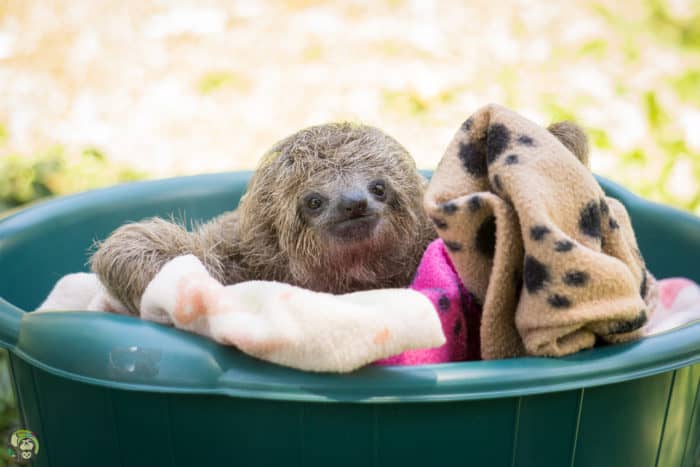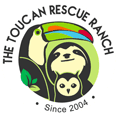Many people living here in Costa Rica have experienced that rare and exciting moment when they look up into a tree on their property and see… a sloth! We live in the land of many sloths, but due to their shy, solitary nature, and their amazing ability to blend in with the surrounding foliage, it’s nearly impossible to spot them.
The adults are fairly large and obvious, once spotted, but imagine his surprise when a local rancher in Guapiles noticed something in one of his trees, only to discover a baby three-fingered sloth! The rancher recalled seeing a much larger wild sloth get a shock from a power line earlier, and wondered if that was the mother, who had since disappeared into the forest. The baby, who was not much larger than a hamster, appeared to be unharmed and healthy. Due to the absence of any possible mother sloth, the rancher carefully removed the baby from danger and contacted the proper authorities.
The Toucan Rescue Ranch, located outside of San Isidro de Heredia, began rescuing and rehabilitating orphaned and injured sloths in 2007 and has grown incrementally since then. In recent years, we’ve implemented a very successful sloth release program called Saving Sloths Together, in partnership with the Sloth Institute of Costa Rica in Manuel Antonio.
This involves raising and rehabilitating orphaned sloths and following a two-year, multi-step program — adhering to the same timeline and developmental steps that young sloths would be following with their mothers until they are old enough to be on their own. At that point, they are released back into the wild, with tracking collars, so that the tracking team members can report back on their progress. Once they prove themselves able to survive on their own, the collars are removed and they have graduated from our program.
Due to being at a higher and cooler elevation, we at the Toucan Rescue Ranch receive mainly Hoffman’s two-fingered sloths, which have thicker fur and are faster and quicker than their counterparts, the very slow brown-throated three-fingered sloths. The three-fingered sloths are the better-known sloths and have captured the public’s heart with their incredibly slow movements and ever-present smile. On rare occasions, one of these very enigmatic creatures arrives on our doorstep and we are equally charmed. Enter Eclipse.
After a heads-up call from MINAE/SINAC (Costa Rica’s Environment and Energy Ministry) this tiny ball of soft wispy gray fur ended up at our facility. We had already received a couple of other very young three-fingered sloths in our care, Luna and Sol, but Sol had recently passed away, having never been able to quite overcome her extensive injuries from electrocution.
Although wild baby sloths would never interact with any sloth other than their mother, the orphans thrive on having other babies to cling to in their mother’s absence, so this new baby’s arrival was very timely. Luna would have a buddy to grow up with. We named him Eclipse.

Although he’s still very young and spends most of his time in a neonate incubator to stay warm, Eclipse has an amazingly strong personality. As someone who takes him and the other baby sloths out to potty daily, I’ve noticed how different he is compared to Luna. He loves to climb on low branches and sniff his surroundings and is starting to get the hang of going to the base of his tiny climbing tree to potty in the soft dirt. He drinks his goat’s milk willingly and attacks his guarumo leaves with gusto until nothing is left but the mid-vein.
Weighing in at under a pound, he has a lot of growing to do before he’s released, but if attitude has anything to do with it, he’ll succeed. In the meantime, we look forward to the day he is big enough to leave his incubator permanently and hang out with Luna, both literally and figuratively. Two little celestial bodies, reaching for the sky.
— Denise Gillen is an Animal Support Volunteer with Toucan Rescue Ranch.

This article was produced by The Toucan Rescue Ranch. The Toucan Rescue Ranch specializes in helping wild animals recover so that they can be reintroduced into the wild. For more information or to donate, visit the Toucan Rescue Ranch website.






